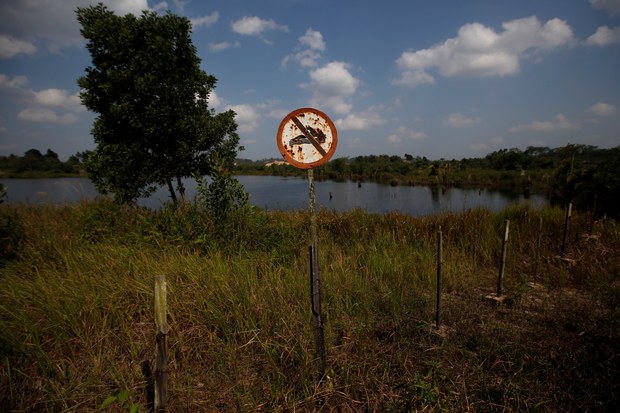3 Chinese workers die in Indonesia coal mine from suspected gas poisoning
2023.03.16
Jakarta
 A “No Swimming” sign is pictured near an old coal mine pit filled with water in Kutai Kertanegara regency, East Kalimantan province, Indonesia, Aug. 30, 2019.
A “No Swimming” sign is pictured near an old coal mine pit filled with water in Kutai Kertanegara regency, East Kalimantan province, Indonesia, Aug. 30, 2019.
Updated at 11:16 p.m. on 2023-03-16
Three Chinese workers died in a coal mining tunnel in Indonesia’s South Kalimantan province of suspected gas poisoning, police said Thursday, in another incident highlighting allegedly poor labor conditions at Chinese-owned companies in the country.
The workers who died Monday were employed at a Chinese-owned coal mine, PT Sumber Daya Energi, in Kotabaru, a regency South Kalimantan province, police said.
Jinxiang Yao, 51, Xuecen Tiang, 41, and Lizie Day, 45, were employed as underground mining specialists and project managers, police said.
South Kalimantan police spokesman Mochamad Rifa’i said a team is investigating the deaths, while Kotabaru police confirmed the cause was poison gas based on a medical examination result.
“The focus of the investigation is to determine whether there was a criminal element in the death of the three foreigners,” Rifa’i told reporters in Kotabaru.
He said the three bodies were at a police-owned hospital in Banjarmasin, South Kalimantan, for autopsies.
Kotabaru Police Chief Gafur Aditya Siregar, said the victims had been found around 2 a.m. Monday.
A total of 13 workers had been in the tunnel when a sensor signaling toxic gas went off. The rest of the workers got out of the tunnel but the victims could not be located, Gafur said. A search party later found their bodies 1.3 km. (0.8 miles) underground.
The deaths shed light on China’s increasing presence in Indonesia’s industrial sector.
Early this month, three Chinese migrant workers filed a complaint alleging abuse at a nickel processing estate. Their lawyer said working conditions were so bad they developed respiratory disorders, memory loss and rapid heartbeat.
Indonesian workers, too, have complained about safety conditions at plants, with tensions culminating in a deadly riot at a factory in Central Sulawesi in January.
More than 42,000 Chinese worked in Indonesia in 2022, accounting for about 44 percent of all expatriates in the Southeast Asian nation, according to the Ministry of Manpower.
A report by China Labor Watch said Chinese workers overseas have experienced many forms of exploitation, including deception, coercion, violence and restriction of freedom that amount to forced labor and human trafficking.
The report said factors contributing to these problems include lack of accountability, oversight, legal protection and international involvement.
After Singapore, China is the second largest foreign investor in Indonesia.
Chinese investments in Indonesia reached U.S. $3.6 billion in the first half of 2022, compared with $1.7 billion in the same period of 2021, according to the Indonesian Ministry of Investment last year.
China is also funding projects in Indonesia as part of Beijing’s Belt and Road Initiative (BRI) worldwide infrastructure-building program. These include the Jakarta-Bandung high-speed rail project, which is expected to be completed in June.
An earlier version incorrectly identified South Kalimantan as a regency.







